 |
Objectives
From 2010-2013 the Gesellschaft für Internationale Zusammenarbeit GmbH (GIZ) implemented the project ‘Support for the reintegration of returning internally displaced persons in their home regions of Vanni, Sri Lanka’. The overall objective of the project was defined as “..the internally displaced persons of northern Sri Lanka have returned to their places of origin and have taken first steps in establishing their livelihoods”.
This project is implemented by GIZ on behalf of the German Federal Ministry for Economic Cooperation and Development (BMZ) in cooperation with the Sri Lankan Ministry of Economic Development and is part of the German Technical Cooperation Assistance on ‘Development-oriented Emergency and Transitional Aid - DETA’. Conceptually, DETA is closely aligned to the approach of ‘Linking Relief, Rehabilitation and Development’, which constitutes a connection between short-term emergency assistance and longer-term development cooperation.
The project’s strategy (that will henceforth be referred to as GIZ-DETA) included three components: i) enhance the livelihoods of resettled communities; ii) ensure access to education and; iii) promote community and social development. The following application example formed part the third component on “community and social development”, where one specific aim was to “safeguard the rights of women and children and to raise awareness to prevent gender-based violence in the Northern Province of Sri Lanka”.
The following describes and discusses the three-pronged approach aimed at preventing violence against women and children and fostering social cohesion in Northern Sri Lanka.
A key capacity development strategy of the GIZ-DETA project was (the methodology and approach undertaken by GIZ-DETA in Sri Lanka has been described in detail the Methodfinder “Capacity Development of sub-national state administrations in post-conflict /post-disaster context”):
- The project worked with and through the government institutions to achieve the project objectives and improving the efficiency of the service delivery of the government institutions (the government provides all services to the final beneficiaries).
- Capacity development was undertaken through on-the-job training and advisory services directly to the government service providers who then in-turn provided capacity development to the beneficiaries.
- A key instrument / tool for achieving capacity development was the local subsidy contract instrument of the GIZ.
|
 |
Context
Gender-based violence (GBV) is widespread in Sri Lanka and has always been prevalent in Sri Lanka society and was particularly acute during and immediately in the aftermath of the conflict that ended in 2009. In Sri Lanka, gender based violence ranges from sexual harassment in public spaces to acts of violence within the privacy of the home or at workplaces. It is acknowledged that the issue of who or which group in society has more power than others and who can exert acts of gender based violence is not restricted to economic power but is very much rooted in notions of social power and hierarchies in access to exercising such power. Incidences of rape, sexual harassment, domestic violence, incest, assault, obscenity against women, unwanted advances, perverted acts, forced pornography, forced prostitution and media violence all prevail in Sri Lankan society. Throughout Sri Lanka gender based violence arises both out of asymmetrical power relations resulting from socialisation processes, as well as gender based discrimination arising from structural violence against women. While these issues receive attention from diverse sectors, the State, non-government sector and civil society, which address preventive measures and provide redress for victims, a great deal more needs to be done (Jayasundere, 2009).
Many children in the Northern Province lost one or both of their parents. They are particularly vulnerable. This is of course also true for those children who were physically injured. According to UNICEF there were almost 4000 cases of reported violence or crime against children in Sri Lanka in 2010 (UNICEF, 2012). It can be assumed that there were further cases that were not reported. The National Child Protection Authority (NCPA) has recently noted an increase in violence and abuse against women and children in the Northern Province. Due to its sensitive nature it is difficult to obtain reliable figures on incidents of abuse or violence. Nevertheless, rates in resettled communities are considered to be especially high. This is compounded by an often dysfunctional system of legal security for women and children. In some cases women and children do not press charges as they are not sufficiently aware of their rights and due to stigmatization. When approaching the topic of gender it is very helpful that many development agencies in Sri Lanka have a holistic approach from different angles. One example of the different perspectives is described in a recent report by CARE International Sri Lanka (2013) that focuses mainly on male attitudes towards gender relations.
Internationally there has been greater appreciation of the importance of the psychosocial dimension to recovery after civil wars. It is necessary to consider support for psychosocial needs to be as important as support for physical needs (IASC 2011). There is also widespread agreement that any form of psychosocial interventions to recover from violence should be rights-based and that both integrated community-focused and individual-focused interventions are needed (IA 2012).
Faced by these multiple challenges in a post-conflict setting, the GIZ-DETA project undertook an innovative approach for addressing many of the above issues by capacitating the government service providers while at the same time strengthening both the communities and individuals in addressing GBV and any form of child abuse. The following application example describes how this was successfully implemented in Northern Sri Lanka.
|
| |
The Three-Pronged Approach
In order to be able to adequately address the challenges outlined above, the GIZ-DETA project supported the government service providers under the purview of the National Ministry of Child Development and Women Affairs in three key areas (compare table 1):
- Strengthening of the counselling services for women and children;
- Ensuring child protection and prevention of GBV;
- Ensuring early childhood care and development.
The advantages of the approach were seen as being:
- Increasing overall acceptance by the communities of the government institutions capacities in addressing violence against women and children
- Enhancing and increasing confidence of the government staff in addressing these delicate issues effectively with the communities. Through on the job training events were jointly planned, organised and implemented between the staff and affected communities that improved confidence and acceptance, an approach that was not that common in Northern Sri Lanka with regard to GBV.
GIZ-DETA project entered into a local subsidy contracts with the following government institutions:
- National Institute of Social Development (NISD)
- National Child Protection Authority (NCPA)
- Ministry of Child Development and Women Affairs (MCDWA), particularly its Planning Unit, Women’s Bureau and Children’s Secretariat
Table 1: Three-pronged approach with main objectives and activities
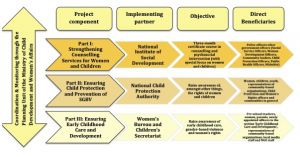
|
| |
Part I: Strengthening Counselling Services for Women and Children
GIZ-DETA supported the National Institute of Social Development (NISD is part of the Sri Lankan Ministry of Social Services) to implement a three-month certificate course in counselling and psychosocial intervention (with a special focus on women and children). The participants were police officers and other government officers working in the project area in the Northern Province. The planned outcome of the project measure with NISD was defined as “Officers active in the Northern Province are trained to address counselling issues related to women and children and promote the protection and wellbeing of this especially vulnerable section of society”.
The implementation of activities involved the following steps:
1. Needs Assessment:
Prior to the start of each course, NISD carried out a needs assessment. NISD consulted a random sample of field officers using a standard questionnaire. The objective was to assess the psychosocial needs of the women and children with whom the officers interacted. Furthermore, the assessment determined the knowledge or skills levels the officers as well as what their actual needs were in order to be able to enhance psychosocial services. NISD also interviewed high-ranking officers that supervised the field officers to ask their opinions on which topics should be covered during the course. In addition, NISD organised consultative workshops in the communities to identify the common needs of the affected population. NISD held group discussions and asked community members to present their views. Even the opinions of affected children were taken into account. Based on the findings of the needs assessment, NISD ran courses both in Tamil and Sinhala languages.
2. Course Design:
After analysing the data obtained through the needs assessments NISD designed the courses and in addition NISD also elaborated a detailed a course handbook. The handbook has been translated from English to both Tamil and Sinhala for all course participants.
The course was composed of four basic modules. During the implementation of the courses the modules were varied in accordance with the participants needs and requirements. The modules included:
- Legal information for government field officers
- Basic counselling skills
- Introduction to psychosocial intervention
- Psychosocial needs of women and children
- Communication skills
- Role of the ‘Children and Women’s Desks’ in the police service
- Law and crime
|
| |
3. Selection of course participants:
NISD contacted high-ranking officials of selected institutions to ask them to put forward members of staff to take part in the course. NISD allowed forty participants per course. Participants included, for example, police officers (especially those working at the Children and Women’s Desks), Child Rights Promotion Officers, Women Development Officers, Rural Development Officers, midwives and preschool or primary school teachers. NISD offered the course free of charge to these participants and their institutions.
4. Implementation of the course:
The three-month certificate course (six days each month) in counselling and psychosocial intervention (with special focus on women and children) was made up of lectures, group discussions, individual studies, written and oral assignments and field visits.
Photo 1 & 2: Training course on psychosocial counseling, safeguarding women and child rights among government officers , police officers
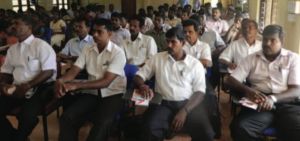
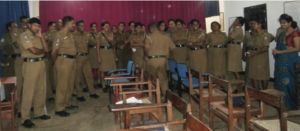
|
| |
Part II: Ensuring Child Protection and Prevention of GBV
The GIZ-DETA supported the National Child Protection Authority (NCPA) to raise awareness on, amongst other things, women and children’s rights. The NCPA is part of the Ministry of Child Development and Women’s Affairs. Its mission includes to “ensure [..] children are free of all forms of abuse”.
The planned outcome of the project supported measures with NCPA were defined as contributing towards “Increased awareness within the communities and among officers on women’s and children’s rights and on how to secure these as well as improved information and reporting services to address and prevent sexual and gender-based violence”.
The implementation of activities involved the following steps:
1. Training the Trainers:
In order to enhance the capacity of NCPA staff members in specialised areas, staff members took part in two courses: ‘Arts-Based Approach to Mental Health and Psychosocial Support’ and on ‘Monitoring and Evaluation’ which were conducted at the ‘Peacebuilding and Development Insitute’ in Sri Lanka.
2. Development of Material:
NCPA prepared different kinds of awareness raising material, including the following handbooks for children, for adults, on the rights of women and children and on the prevention of abuse and GBV.
A leaflet for children on the implications of ‘good touch, bad touch’ was developed to help explain the concept of child sexual abuse in very simple language. The objective of the leaflet was to help children understand that when being this can either make them feel “good” or “uncomfortable” and they needed to learn how to differentiate this and speak-up if something happened.
Furthermore, advice was also offered on how children can keep safe, with whom they can talk to safely, when necessary. NCPA also developed a poster with many illustrations explaining how younger children should protect themselves. Examples included advising children to always wait in well-lit areas, etc. NCPA developed an annual calendar that included child rights in three different languages.
All published materials were aimed at promoting the “The Child Line 1929” as the telephone help-line number that children and adults can use to report child abuse or to seek advice and support. The materials were extensively distributed mostly to schools, children’s homes, weekend schools and state departments in the project area.
|
| |
Photo 3 & 4: Example of handbook on child rights and sticker to promote the telephone number “1929”Childline Sri Lanka
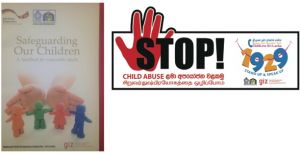
3. Awareness Creation Programmes:
NCPA carried out awareness-raising programmes that included the distribution of the leaflets, stickers and handbooks at community level. For example, some of the events were aimed specifically at adults and had a particular emphasis on child protection and health promotion and other events were particularly for youth and school children. NCPA then also emphasised key messages through the stickers and undertook media campaigns in the streets.
Photo 5 & 6: Material prepared to disseminate key messages and create awareness

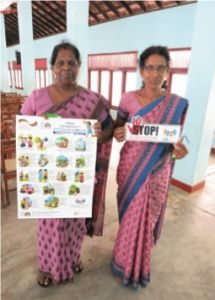
NCPA organised women’s forums or coffee gatherings during which it covered topics such as women empowerment, health promotion and positive parenting skills. It supported women in the formulation of community action plans where the women’s priorities were defined for future developments measures.
- NCPA carried out workshops in Sinhala and Tamil for pre-school and primary school teachers and youth. As many as 200 participant at time attended these NCPA workshop. In other workshops NCPA explained women’s and children’s rights and discussed issues of violence and abuse with community based organisations. For state representatives such as the Child Protection and Women’s Rights officers, NCPA ran tailor-made capacity-building measures.
Part III: Ensuring Early Childhood Care and Development
GIZ-DETA supported the Women’s Bureau and the Children’s Secretariat of the Ministry of Child Development and Women’s Affairs to raise awareness on early childhood care, gender-based violence and women’s rights. Part of the mandate of the Ministry of Child Development and Women’s Affairs includes that it “develops, implements, monitors, evaluates and coordinates the policies and programmes for the realization of the rights of women and children [...]”. The expected outcome of the measure supported by GIZ-DETA was: “Improved early childhood care and development to ensure the wellbeing of vulnerable children and women in the Northern Province”.
The Women’s Bureau and the Children’s Secretariat designed different activities for different stakeholder groups, including:
- For parents and leaders of community-based organisations, the Women’s Bureau and Children’s Secretariat ran courses on early childhood care and the first one thousand days of a child’s life.
- The Bureau undertook skills-development training to better equip pre-school teachers
Photo 7: Puppet therapy workshop to overcome trauma
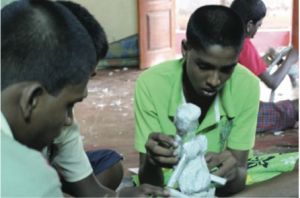
For newly appointed officers working in the section of Early Childhood Care and Development in the Northern and Eastern Province, the Women’s Bureau and Children’s Secretariat conducted a four-day residential orientation course in Tamil. The course included nutritional requirements, movement and education in early childhood, the development of children with special needs and covered the responsibilities of government officers.
- The Women’s Bureau and Children’s Secretariat designed two specialised full-day programmes that was implemented in five districts Northern province: for local media persons and NGO personnel the programme included awareness creation on Women’s Rights; for community leaders and representatives of community based organisations the programme not only addressed women’s rights, but also gender-based violence.
Monitoring and Evaluation
In order to maximize the impact the overall task of monitoring and coordination lay with Planning Unit of the Ministry of Child Development and Women’s Affairs. The GIZ-DETA project capacitated the Planning Unit in undertaking the challenging task of monitoring and coordinating the three-pronged process. Capacity building included, for example, that a GIZ-DETA staff worked closely with the planning unit staff members for one week per month (as part of on-the-job training).
The Planning Unit was also supported in the establishment of a Coordination Committee. The Coordination Committee was composed of representatives of the NCPA, the NISD, the Women’s Bureau and Children’s Secretariat, GIZ-DETA, the Secretary and the Planning Unit of the Ministry of Child Development and Women’s Affairs. Overall chairperson was the Secretary of the Ministry of Child Development and Women Affairs.
The Coordination Committee met bi-monthly to report on the project progress and to safeguard effective implementation of the measures.
In some cases it became apparent that one or more of the implementing partners required specific tools and equipment to implement the project measures and the GIZ-DETA project was then requested to support the relevant partner by providing the necessary equipment (e.g. multi-media projector or laptop computer for data processing or motorbike to improve outreach programmes).
Photo 8: Assessing the impact of activities through interviews
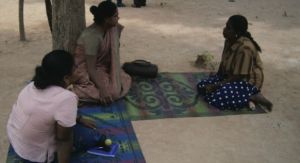
Impact and lessons-learnt
- Conflict sensitivity: The project measures actively assisted community members to openly talk about violence against women and children. It provided a “space” for those affected by the problems to be heard and allowed them to talk more freely about other topics that affect them equally. Initial signs indicate that by being able to discuss difficulties and concerns in the communities early on open and possibly violent disagreements could be avoided and localized solutions found.
- Community based approach: The community based approach of addressing the gender based violence issues also proved more effective than working only with individual community members. Not only was a better outreach possible but also allowed more community members to participate in the process to foster social cohesion. Whenever individual members were supported, care was taken to ensure that the selection criteria and the names of those receiving support were made public.
- Coordination and transparency: Working in a post-conflict environment necessitates ensuring complete transparency in order to avoid causing additional tensions. The transparency between the GIZ-DETA project and the government partner organization was as important as ensuring effective dialogue and coordination between the different government departments. GIZ-DETA project made use of the Provincial Coordinating Committee in order to share information across all the different implementing partners, to ensure complete transparency and ensure the effective monitoring of the project activities.
In addition, throughout the project process the national, provincial and local levels of state institutions were either directly consulted by the project or through the Provincial Steering Committee. For example, the NISD actively sought and obtained approval for the implementation of the courses designed with the support of the project from the Ministry of Health at the national, provincial and regional levels.
Need for more effective link between victims of domestic violence and “safe-houses”: In future additional support is needed to promote a link between assistance to victims of domestic violence and the promotion or setting up of “safe houses”. Safe houses would constitute places where women and their children can go as a last resort to be protected from a person that abuses them. A key is that the victims can always rely that they will be taken in and will be accepted in these “safe-houses”.
Furthermore, the concept of self-help groups should also be encouraged to help victims of sexual violence to discuss and address the issues that affect them in a group-based approach. This would allow them to support each other and to discuss their difficulties with people in a similar situation.
- Initial impacts: The initial impact of the GIZ-DETA project measures has been to substantially increase the knowledge base of both the government officers and the communities on the whole aspect of sexual and gender-based violence (GBV), the protection of women and children and family reunification. By knowing their rights more clearly the affected community members can also help prevent further incidences of such violence.
Initial anecdotal evidence shows also that having a better understanding that violence against women and children is a recognised crime has also contributed to preventing such violence. However, more information is needed to also help reduce the stigmatisation of victims. As parents and children have a better understanding of how children can better protect themselves then initial anecdotal feed-back from children does show that the risk of child abuse is being reduced, if only minimally.
It is highly commendable that many teachers took part in workshops on preventing child abuse. This impact could also be further enhanced if the Sri Lankan authorities ensured that all doctors are also aware of the problems and the necessary measures and procedure that are available for addressing them.
Additional support measures through international donor organisations: A greater impact could also be achieved if other international donor organizations also further support the Sri Lankan government to promote, train and support female state representatives to work with female victims of violence. This would help to increase the number of trained and sensitized female state officers who can actively work with the community members’ government and NGO organizations.
In addition, it would be desirable if the government encouraged or trained more female doctors to work in this area. This is especially important in particularly conservative sections of Sri Lankan society.
Photo 9: Art therapy and introduction to storytelling
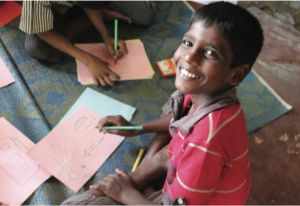
- Additional support measures for judiciary: While the three-month course for police officers and other government agents supported by GIZ-DETA on improving their psychosocial skills has helped to better equip them to understand the victims, more needs to be done within the judicial system.
The judicial system would benefit from having a better understanding and competence in addressing issues related sexual gender-based violence (GBV), the protection of women and children and family reunification. Measures could include providing capacity building support to state officials in the justice sector, encouraging greater free and fair reporting in the press of violence against women and children, improving fair representation in justice system of both the victims and the accused.
The combined impact of these measures is also likely to eventually encourage more women and children to report abuses to the authorities as they will feel that they are being fairly treated by all concerned.
|
 |
References:
BMZ (2009) Development Policy Action Plan on Gender 2009-2012, Strategies 185
Care International Sri Lanka (2013) Broadening Gender: Why Masculinities Matter, Attitudes, Practices and Gender-based Violence in Four Districts in Sri Lanka
Child Protection Working Group (2012) Minimum Standards for Child Protection in Humanitarian Action
Human Rights Watch (2013) We Will Teach You a Lesson, Sexual Violence Against Tamils by Sri Lankan Security Forces
Humanitarian Aid and Civil Protection of the European Commission (2013) Gender: Different Needs, Adapted Assistance, ECHO Factsheet
IA (2012) Final Report of the Conference on Responding to the Psychosocial and Mental Health Needs of Sexual Violence Survivors in Conflict-Affected Settings
Inter-Agency Standing Committee (2011) IASC Guidelines on Mental Health and Psychosocial Support in Emergency Settings, Advocacy Package
International Development Committee of the House of Commons (2013) Violence Against Women and Girls, Second Report of the Session 2013-14
Jayasundere, Ramani (2009) Understanding Gendered Violence against Women in Sri Lanka; Background Paper for Women Defining Peace; Technical Consultant to Women Defining Peace
National Child Protection Authority (2013) Puppet Tales: Puppet Play Therapy with Children in the North
UNICEF (2012) Briefing Sheet Child Protection Sri Lanka
United Nations Security Council (2012) Conclusions on the Situation of Children and Armed Conflict in Sri Lanka
|